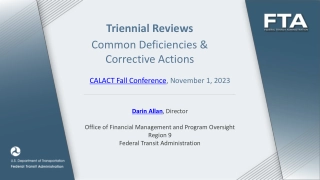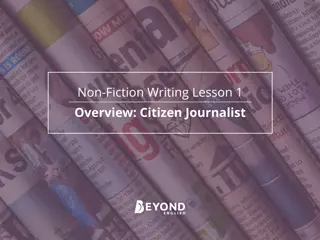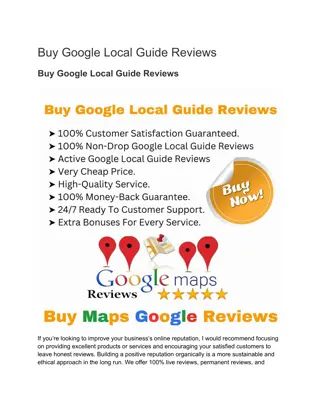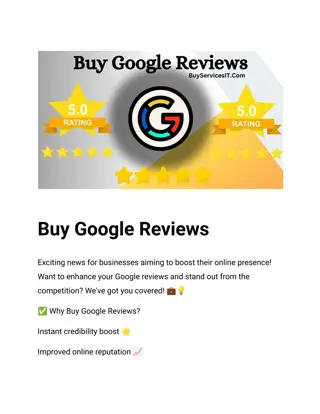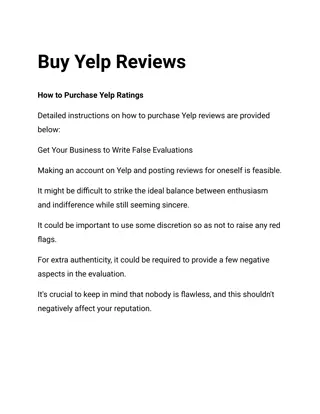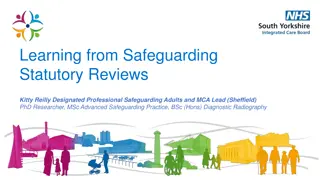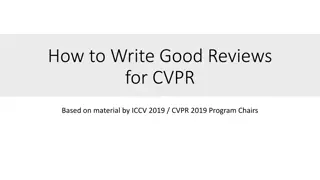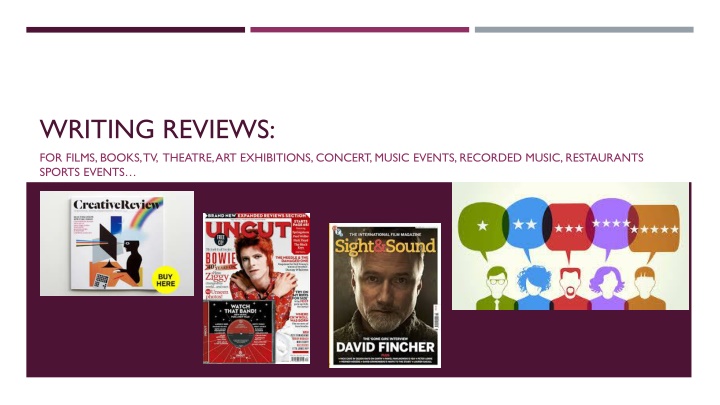
Mastering the Art of Writing Reviews: Essential Steps & Tips
Learn how to write compelling reviews for various mediums like films, books, music, and more. Explore key steps such as deciding what aspects to evaluate and determining what makes something good or bad. Uncover the secrets to delivering thoughtful and engaging reviews that captivate your audience.
Download Presentation

Please find below an Image/Link to download the presentation.
The content on the website is provided AS IS for your information and personal use only. It may not be sold, licensed, or shared on other websites without obtaining consent from the author. If you encounter any issues during the download, it is possible that the publisher has removed the file from their server.
You are allowed to download the files provided on this website for personal or commercial use, subject to the condition that they are used lawfully. All files are the property of their respective owners.
The content on the website is provided AS IS for your information and personal use only. It may not be sold, licensed, or shared on other websites without obtaining consent from the author.
E N D
Presentation Transcript
WRITING REVIEWS: FOR FILMS, BOOKS, TV, THEATRE, ART EXHIBITIONS, CONCERT, MUSIC EVENTS, RECORDED MUSIC, RESTAURANTS SPORTS EVENTS
AIMS OF SESSION To discuss and identify what a review should look like? To research, acknowledge published examples and use to influence our own writing. Identify the steps and requirements of writing a review. To research and review a musician, song or album. (see on-line for other reviews to compare and contrast with yours) To write a review of two different mediums/forms from: For films, books, TV, theatre, art exhibitions, concert, music events, recorded music, restaurants, sports event
WHAT DO YOU KNOW? What is a review? What does the reader or viewer expect from the reviewer? How do you deliver theses expectations? Who do you go to when you want to find out about a song, a film, a match, an exhibition, a concert etc. Research a review and note down your initial thoughts (10 mins)
WRITING REVIEWS: FOR FILMS, BOOKS, TV, THEATRE, ART EXHIBITIONS, CONCERT, MUSIC EVENTS, RECORDED MUSIC, RESTAURANTS http://www.slideshare.net/no1jenn/jo-ureviews
STEP ONE: DECIDE WHAT TO LOOK AT The first thing you need to do before you start your review is decide what aspects of the item you are going to evaluate. What I mean is this: what is it that can be good or bad about something you're going to review? An example: when you're watching a movie, you can look at the acting, the special effects, the camera work, or the story, among other things. Those are all items you can examine and decide if they are well or poorly done. With a book, you can look at the plot, the characters, and the way that the author puts words together. With a restaurant, you can look at the food, the service, and the setting. In fact, everything has qualities you can analyse and evaluate; you just need to sit down and figure out what they are.
STEP TWO: DECIDE WHAT MAKES THINGS GOOD OR BAD Before you can decide whether something is good or bad, you have to figure out what you mean by "good" and "bad." Do you like stories that have a lot of action or a lot of character development? Do you like acting that's realistic or acting that's wild and nutty? Do you like authors to use a lot of complicated words, or very simple words? You decide. Whatever you like, apply those standards to the thing you are reviewing.
HOW TO DO IT: It is now time to start putting your essay together. Here's a pretty simple format you can follow: 1.Open with an introduction paragraph that does the following things: catches the reader's attention; identifies the thing you'll be reviewing (e.g., the title of the book or movie); identifies the author, star, or director, if appropriate. How to do it 2.Write a full paragraph about each of the aspects you want to examine, making sure each paragraph does these things: opens with a topic sentence that says what the paragraph is about; has several detail sentences that prove the point you are trying to make; uses quotes or examples from the book or movie, if possible, to help prove your point. 3.End with a conclusion paragraph that does the following: *briefly* restates the main ideas of the review; makes a judgment about the book or movie or whatever, saying whether it is good or bad (some reviewers give ratings, like four stars or two thumbs up); recommends that the reader go to the movie or read the book or buy a meal at the restaurant (or not, if it is no good).
How to Write Good Sports Journalism The world of sports journalism is full of plenty of opportunities if you have a way with words. But covering sports in the journalism profession isn't necessarily about the sports. It's about telling a story to the audience through reporting and writing. Great sports journalists know how to lead the audience into wanting more when they write. They tease with a great hook, pulling in the reader. Read more: Instructions: o 1 Be prepared when recording facts for your sports story or article. Carry a notebook and pen or an electronic device when interviewing an athlete. This can prevent misquotes from happening and can ensure accuracy. o 2 Figure out what your audience doesn't already know. This is the reason why people should pick up the newspaper. People rarely care enough to read more about information they already know. o 3Tease the audience when preparing your sports story or article. You want people to be entranced enough to find out what you have to say. If you watch teasers for sports on television, you can see examples of this during the broadcast. Try not to provide all the information, but just enough that the audience wants to find out more. o 4 Talk with people in charge of photos and ask them to run a picture with your story. It helps to put a face with the name or event you're covering. o 5 Make sure you record the five W's in reporting: who, what, when, where and why. You should learn this in journalism classes. It's best to open with the most vital information.
FOR THE LOVE OF BANDS: WORK EXPERIENCE https://fortheloveofbands.com/category/reviews/
TASKS: To research and review a musician, song or album. (see on-line for other reviews to compare and contrast with yours) To write a review of two different mediums/forms from: For films, books, TV, theatre, art exhibitions, concert, music events, recorded music, restaurants, sports event
FOR THE LOVE OF BANDS: WORK EXPERIENCE https://fortheloveofbands.com/category/reviews/
LEARNING OBJECTIVES FOR THIS FIRST PROJECT: Critically compare a range of communication methods (newspapers, novels, TV programmes, films etc.) used to convey meaning in creative media production (the making of newspapers, novels etc). Understand the characteristics and methods of communication within a media context (the main ingredients to writing a story, and article, a poem, a review etc. ). 1.1 Critically compare a range of research tools, method and skills. 2.1 Critically compare a range of primary and secondary research sources. Be able to use design and research tools, methods and skills to inform ideas for creative media production. Understand critical perspectives that influence the analysis of creative media production activities I.E. evaluate others work and use this to reflect back upon your work.


